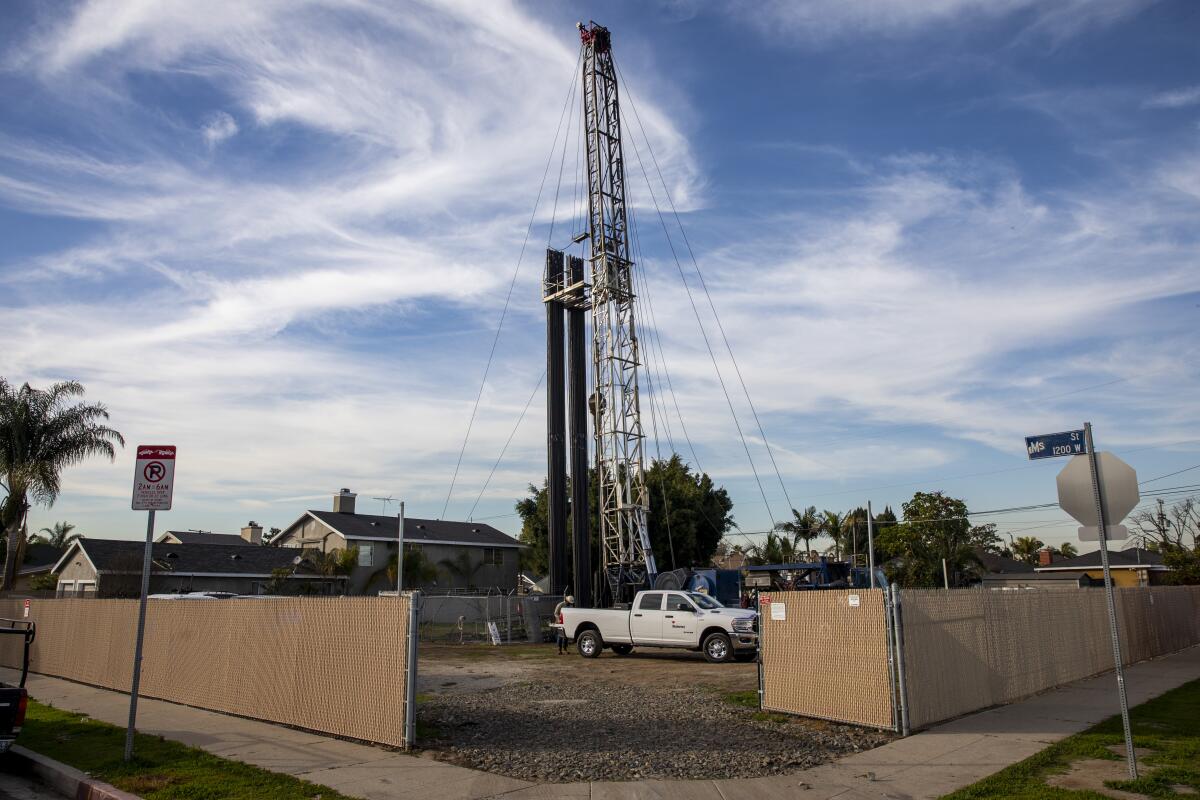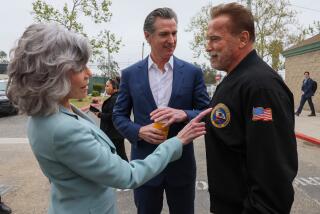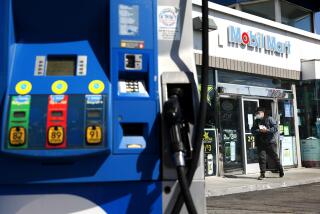Editorial: Oil drillers want to overturn California’s new health protections. Don’t let them

You might soon be approached outside your grocery store by signature gatherers urging you to sign a petition about lowering gas prices or stopping a so-called “energy shutdown.”
Here’s what it’s really about, and why Californians shouldn’t sign it.
Last month, Gov. Gavin Newsom signed Senate Bill 1137, which bans new oil and gas wells within 3,200 feet of homes and schools to protect public health and safety. The oil industry failed to defeat the buffer-zone bill in the Legislature — as it had in the past — so a few days later it filed a petition to put a referendum on the 2024 ballot to overturn the law.
The effort is being led by the California Independent Petroleum Assn., an industry lobbying group that says it has raised $8 million and this week began dispatching paid signature gatherers who are presenting the referendum as an opportunity to lower gas prices. But voters should see past that misleading messaging. This is an attempt by oil drillers to keep harmful and polluting operations in California neighborhoods. It is an attack on our health and safety that should be soundly rejected.
The L.A. Times’ editorial board endorsements for statewide ballot measures, elected offices in Los Angeles city and county, L.A. Unified School District board, L.A. county superior court, statewide offices, the state Legislature and U.S. House and Senate seats.
It’s not surprising that powerful interests that lobbied against these protections are now trying to block them from taking effect. The law finally put restrictions on neighborhood oil drilling that for decades has been allowed to operate in a Wild West-like atmosphere that allows oil extraction practically anywhere, even right next to schools, parks and homes.
It’s important to note that the referendum’s proponents, who have until Dec. 15 to collect 623,212 valid signatures, would score a significant victory just by qualifying it for the ballot. The law, which is scheduled to take effect on Jan. 1, would be halted for nearly two years until voters decide its fate on the November 2024 ballot.
A delay would extend the harm from drilling. More than 2 million people live within these roughly half-mile buffer zones. Proximity to oil and gas wells is associated with an array of health problems, including asthma, preterm births and reductions in lung function.
Half a century after Congress adopted the Clean Water Act, the nation’s waterways remain at risk and are facing new challenges.
There are few details yet on who is supporting the referendum, but the committee backing it, called Stop the Energy Shutdown, has received one contribution that has been publicly disclosed, for $1.15 million, from Macpherson Oil Co. A spokesman for the Western States Petroleum Assn., the industry’s most influential lobbying group, said it is not involved.
State Sen. Lena Gonzalez (D-Long Beach), who authored SB 1137, said the referendum is just one piece of an industry campaign of intimidation and misinformation about what the new law would do.
“It’s just sort of the DNA of a lot of these industries and interests that they are going to use money and power and greed to overturn good legislation,” she said.
The push is only the latest example of big business interests in California using their money and influence to try to squash new laws they don’t like. At the going rate of about $17 per signature, it can cost around $17 million to gather 1 million signatures and get a referendum on the ballot, said Jamie Court, president of the nonprofit advocacy group Consumer Watchdog. An industry facing a strict new law may see that as money well spent, even if all it gets are the added profits from a two-year delay.
The same thing is happening with another new law Newsom signed that creates a Fast Food Council that’s empowered to set working standards and raise the minimum wage to as high as $22 an hour next year for fast-food workers. The restaurant industry is gathering signatures for a referendum to overturn that law too. And this November, voters will decide on a referendum that Big Tobacco was able to put on the ballot to stop a 2020 law that bans sales of most flavored tobacco products, including menthol cigarettes. Even if voters uphold the law by voting yes on Proposition 31, the industry succeeded in delaying the ban and reaping two more years of profits from these dangerous products.
Neighborhood drilling is unhealthy and should have stopped long ago. Californians should reject the industry’s push to make an end run around the new law by keeping the referendum off the ballot.
More to Read
A cure for the common opinion
Get thought-provoking perspectives with our weekly newsletter.
You may occasionally receive promotional content from the Los Angeles Times.








